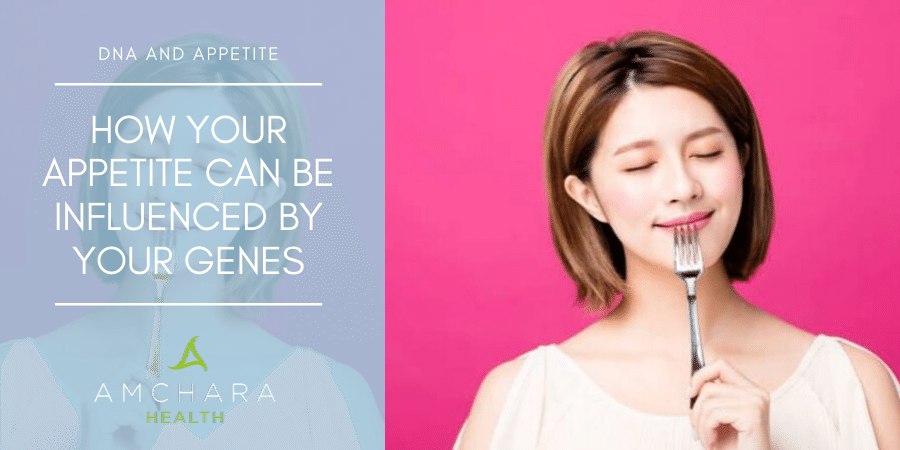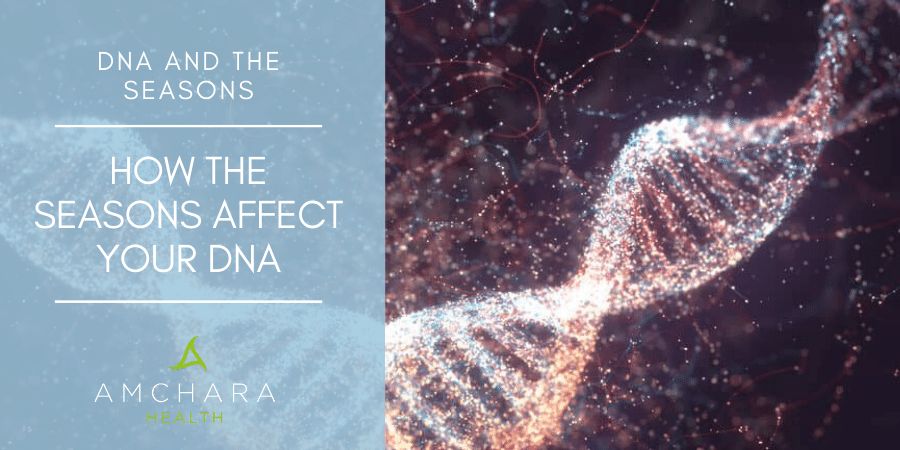Topics Covered in this article:
It should come as no surprise that we’re all unique.
Here at Amchara, we champion the concept of personalised health, and part of this is the understanding that our individual genetic makeup influences our health status in complicated ways.
Our evidence-based approach is orientated towards the Personalised Health approach which treats you as an individual and takes a tailored approach considerate of your unique physiology.
Our mission is to provide you with both insightful information to provide you with actionable knowledge and tips you can trust, to help you on your journey to optimal health.
In this article, we’re going to look at the genetic basis of appetite and its influence on weight management.
Genetics and weight
Genetics is often blamed for persistent weight gain and an inability to lose weight because it’s known our genes can influence our metabolic rate and our ability to burn fat as fuel.
But we are starting to find out our genetic influences stretch further than this.
Our personalised genetic makeup can influence our taste sensitivity, food preferences, eating behaviour and our portion sizes.
Genes can affect how appealing a food is to us and how full we feel after eating it.
Eating is a complex relationship between physiological requirements, psychological factors, social influences and genetics.
They together influence how much we eat, our food preferences and when we eat.
Appetite control
Our appetite is regulated by two main hormones, leptin and ghrelin.
There are also other hormones involved such as CCK.
The interplay of these hormones tells us when we want to eat and when we feel full.
- Leptin
Leptin is made by our fat cells. It’s concerned with the long-term regulation of appetite and energy intake.
Leptin has the job of inhibiting hunger by affecting receptors in clusters of brain cells in the part of the brain known as the hypothalamus.
These influence body weight by regulating appetite in response to messages from leptin. Leptin itself is believed to be released in response to changes in our body fat levels.
- Ghrelin
Ghrelin has the opposite effect to leptin, because it makes us hungry. It stimulates appetite by again stimulating receptors in the hypothalamus.
It also encourages the body to lay energy down as fat and may influence the metabolism of sugar.
Ghrelin levels would normally drop after we have eaten, so reducing our appetite.
- CCK
This hormone is released after eating fatty foods, helps digestion and leads to a rapid feeling of fullness.
Effect of genetics on appetite
Genes direct the functioning of proteins and enzymes throughout the body as well as telling cells how to behave.
You may have heard of single nucleotide polymorphisms, often called SNPs, which represent differences in DNA building blocks.
These are the most common type of genetic variation. We each have between four and five million SNPs, but there are at least 100 million SNPs in existence.
SNPs may predict our risk of developing certain diseases, our response to certain drugs and our susceptibility to toxins.
Scientists are now finding these SNPs may also play a role in our eating behaviour.
Ideally, as our body’s energy requirement increases, our appetite would increase, we would feel hungry and we would eat.
When we’ve taken on board sufficient energy our appetite would decrease.
However, in practice, not all changes in appetite reflect our energy needs.
Some people have a large appetite and habitually eat more than their bodies require. Their satiety mechanisms have gone awry.
Some differences in appetite between person to person may be due to genetic variations – particularly the SNPs we mentioned earlier.
Satiety and genetics
Variants in the LEPR gene, which is responsible for directing the release of leptin, can mean it’s not released when needed.
People with this genetic variant don’t feel full after eating.
Researchers looked at both obese and normal weight women and found this type of gene variant was connected with excess snacking.
One gene variant, called the FTO gene but commonly dubbed the ‘fat gene’, may contribute to obesity by reducing the production of leptin, making people hungrier after meals (1).
Studies have found children with a mutation in this gene ate a higher proportion of energy-dense foods, without expending this energy.
Variants in the gene instructing CCK release, on the other hand, have been found to be associated with a preference for eating bigger meals but not increased snacking.
So, genetic variations in genes encoding CCK and leptin may contribute to the risk of obesity by influencing satiety in different ways.
Genetics and hunger
A gene known as the GHRL encodes for ghrelin production.
SNPs of this gene are associated with higher BMI and have been found to lead to reduced insulin secretion when glucose is eaten (2).
Mutations of the ghrelin gene may also play a role in binge eating disorders (3).
One FTO gene variant appears to prevent the usual drop in ghrelin after eating (4).
This can predispose us to obesity.
Researchers found subjects with this gene variant who were shown pictures of high-calorie food after eating a meal rated the pictures as more appealing than those without the gene mutation.
A mutation of another gene known as KSR2 makes people hungrier than normal.
It also appears to hinder the breakdown of stored fat and is significantly associated with Type 2 diabetes.
Effect of genetics on taste
The sensation of taste influences how much or how little we eat, as well as our preferences for different types of food.
Why is it that some people crave sweet foods while others love bitter foods?
Is it down to habit, conditioning or even willpower?
While these may certainly have an effect, we now know genetics play a role too.
People don’t experience taste in the same way.
This may be because we have differences in the sensitivity or number of our taste receptors, as well as differences in how our receptors react to the chemicals in food which give it taste.
Substances in our saliva, which naturally alter over time, may also change taste perception. These can all be influenced by genetics.
This is particularly marked when it comes to sweet and bitter tastes.
Even tiny variations in our genetic code can influence our sensitivity to these tastes.
We have two types of taste receptors, TAS1R and TAS2R, which are responsible for tasting sweet and bitter tastes respectively.
Interestingly these receptors are present in both the mouth and in the digestive systems, where they play a role in the absorption of nutrients once they are eaten, as well as in the release of insulin and so glucose metabolism.
- Sweet genes
Some people can resist those sweet treats while others will admit to having a sweet tooth.
Researchers found tiny differences in a gene called SLCa2 determine whether people prefer sweet or savoury foods.
This gene produces a protein which moves glucose around the body and into cells, with the result that we feel full once our blood sugar levels have returned to normal.
Mutations of this gene prevent our brains knowing when we’ve eaten enough sugar.
Such people have been found to eat more sugar, although they don’t eat more of any other type of food.
This gene variant is also correlated with Type 2 diabetes.
A second sweet tooth gene called FGF21 had been found to be connected with sugar cravings.
Normally, sugar would become less appealing to us once we’ve eaten a certain amount, but people with a variation to this gene don’t have the same brakes on sugar consumption.
However, surprisingly, these people appear to have a predisposition to less body fat, but often suffer from slightly higher blood pressure (5).
- Bitter taste preference
Certain people are extremely sensitive to bitter foods – they are called supertasters.
Being able to taste bitter substances really well makes evolutionary sense because certain plants contain toxic chemicals and the unpleasant taste would be a warning not to eat them.
Some people have an average sensitivity to bitter foods while others – the non-tasters – have a low sensitivity.
Supertasters are more sensitive to chilli and they also usually avoid beer and coffee, which taste bitter to them.
They often intensely dislike foods which contain a substance called 6-n-propylthiouracil (PROP), such as grapefruit, brussels sprouts, leafy greens and kale.
However, because the taste of all foods is heightened for supertasters, they may have strong dislikes for other foods too such as high fat foods or even sweet tastes.
In fact supertasters tend to be fussy eaters, as all foods taste stronger to them, and they may use more salt to mask the bitterness of foods.
Supertasters have a greater density of taste buds on their tongues (6).
This is why they tend not to like chilli, as pain receptors are situated adjacent to taste buds, so these people have more pain receptors on their tongue.
Around 25% of the population are supertasters, and more women are supertasters than men.
Average tasters tend to like most foods. Non-tasters can’t detect the taste of PROP at all.
Variation in sensitivity to these bitter-tasting molecules has a strong genetic component, and has been linked to variations in taste receptor genes.
A heightened sensitivity to bitter tastes can be related to a lower BMI and reduced cardiovascular risk, however, supertasters have been found to have increased risk of colon polyps and even cancer.
Surprisingly, research found supertasters did not eat less bitter vegetables overall than non-tasters, so the link is far from clear.
Studies have linked lower taste sensitivity with a higher BMI.
In one study, BMI was found to be 6.2 units higher in non-taster women compared with supertaster women (7).
Non-tasters have a preference for sweet, high fat foods and tend to drink more alcohol.
Genetics and food addiction
Research has discovered a link between genetics and food addiction.
A high percentage of overeaters or food addicts have at least one blood relative with a food addiction.
One study found overweight subjects who tended to binge on carbohydrates had a similar genetic aberration which is also a marker for alcohol dependency.
It’s connected with the release of dopamine, the brain’s pleasure neurotransmitter.
DNA and food choices
We’ve already seen how the FTO gene may cause people to choose more nutrient-dense foods, as well as the major influence of our taste receptors.
A variant of a gene known as GAD2 also plays a role in food choices.
This gene codes for the formation of GABA. This is a neurotransmitter involved in the regulation of food intake.
Higher levels of GABA are linked to eating less.
One study found that in women, SNPs on this gene were connected with susceptibility to hunger and increased carbohydrate and fat intakes, which was linked to fat gain – twice the amount of weight was gained over six years (8).
We know the brain’s sensitivity to glucose levels is involved in regulating food intake because the brain is very reliant on a constant supply of glucose.
One study showed people with a genetic variation in the GLUT2 gene ate more sugar over an average day.
This suggests some sort of glucose-sensing mechanism which regulates food intake (9).
We are not at the mercy of our genes
All this means if you’ve been trying to lose weight or beat your sugar cravings without success, there may be a genetic reason.
However, our DNA blueprint is only partially fixed. We can rewrite our genetic code by paying attention to our lifestyle or eating habits.
This is known as the effect of epigenetics.
Knowledge is also power.
For example, if we know from our genetic code we are at an increased risk of putting on weight because of our inbuilt taste preferences, or we are aware our DNA variants are connected with cardiovascular disease, we can pay special attention to making sure our lifestyle includes sufficient exercise to keep our body weight within a healthy range and ensuring we eat plenty of heart-healthy nutrients.
Takeaway
Amachara practitioners offer genetic testing which can look at how your own unique genetic code can influence your appetite and the way your body deals with the food you eat.
Such testing can also reveal your individual susceptibility to chronic illnesses.
We believe sharing knowledge and experience is an important part of achieving optimal health and would love to hear your views and experiences.
With your help let’s continue the conversation.
Did you find this article useful?
Please share your thoughts in the comments.
READ THIS NEXT:





